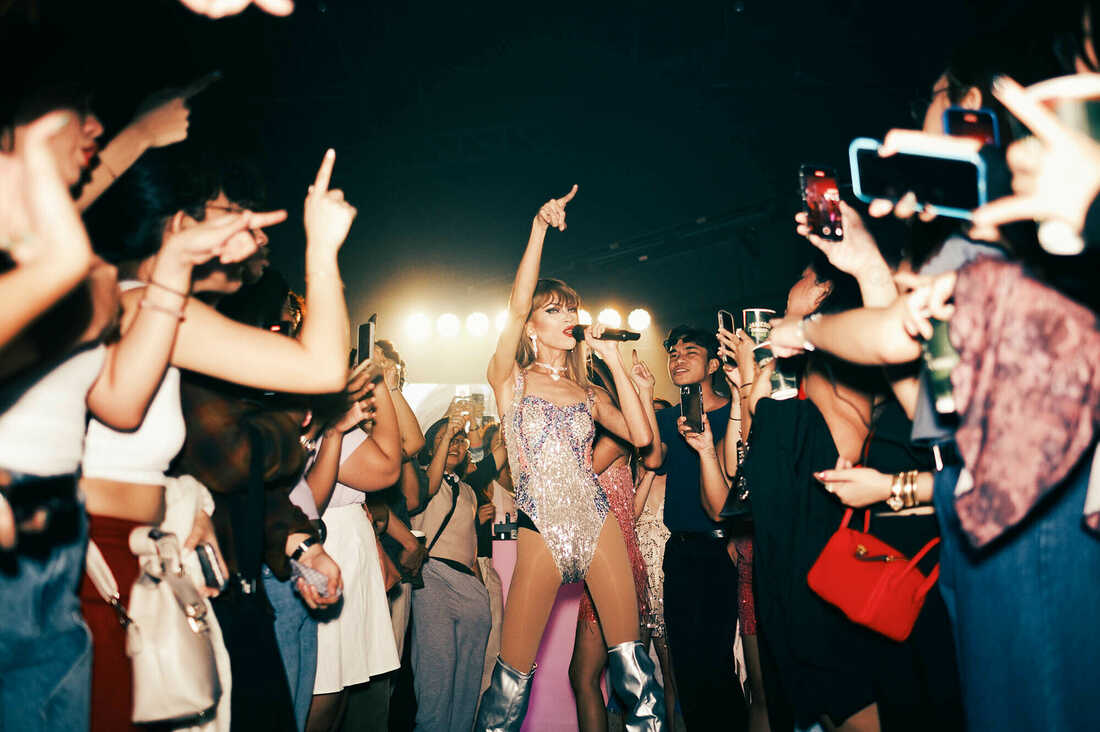Taylor Sheesh, the Philippines’ top Taylor Swift impersonator, has set out on her own tour across the country in a bid to get the global superstar’s attention.
Taylor Sheesh
hide caption
toggle caption
Taylor Sheesh

Taylor Sheesh, the Philippines’ top Taylor Swift impersonator, has set out on her own tour across the country in a bid to get the global superstar’s attention.
Taylor Sheesh
MANILA, Philippines — On a recent Saturday night at Brooklyn Warehouse, a large event space in Metro Manila, a tall thin blonde steps onto a long black stage lit up by dancing strobe lights and the glow of hundreds of smartphones set to record.
The crowd loses its mind as she struts, twirls and dances down the stage, clasping a black microphone in one hand.
Her soundtrack?
Taylor Swift’s “Lavender Haze.”
But she’s not singing.
And though her hair, makeup and sparkly tasseled dress are all on point — she is not Taylor Swift.
She is Taylor Sheesh, the Philippines’ top Taylor Swift impersonator, whose own tour around the country is uplifting the spirits of Filipino Swifties (what Swift’s fans call themselves), disappointed that the real Taylor did not add the country to the Asian leg of her The Eras Tour.
Taylor Sheesh is the drag persona of Mac Coronel, 28, of Manila. He says that even though he’s been impersonating Swift onstage since late March, it can still take hours to get into character.
“If ever there’s a big production, it will take one or two weeks because I need to practice the [choreography], the costumes and her makeup and also the wig,” he told NPR. “So I’m trying to get 90% accurate.”
It’s working.

In recent months, Taylor Sheesh has skyrocketed in popularity on social media. Now she’s filling event spaces with her concerts, all involving lip-syncing a medley of Swift songs carefully edited together.
Coronel thinks it’s “so very sad” that Swift isn’t coming to the Philippines.
“So we’re trying to get her attention because the Philippines is Taylor Nation Country,” he says.
Indeed, for years Swift has dominated Philippine rankings for the most-streamed artist. And last year, according to Spotify, she was the country’s No. 1 listened-to artist.
This devotion has spilled into ticket sales for Swift’s concert schedule for other parts of Asia, such as Singapore, where she will be performing six concerts.
Klook, a Manila-based travel agency and official partner for The Eras Tour’s Singapore dates next year, reported that not only did its travel packages to Singapore — which come with two concert tickets and a hotel room and cost the equivalent of hundreds of dollars — sell out in less than 24 hours, most of their customers to snap them up were from the Philippines.
Though Swift did perform in the Philippines in 2014, the reasons for her not coming now vary, though none are certain.
Many disappointed Swifties NPR spoke with bemoan the Philippines’ lack of money to afford Swift shows, as well as the lack of concert infrastructure, namely a stadium big enough to cater to her — both valid arguments, says Peter Delantar, president of Insignia Presents, a Manila-based concert promoter and events company.
Not only can artists’ fees be a huge expense, but the Philippines’ only conveniently located stadiums can also only hold about 12,000 people, Delantar says. “I feel like there’s a lot more artists now that are able to sell 10,000-plus tickets. Infrastructure-wise, we haven’t been able to catch up.”
As Filipinos blame themselves for failing to lure Swift to perform in their country, they hold out hope.
“It’s OK,” Swiftie Nika Cel Benitez, 22, of the Philippine province of Cavite, says. “Maybe there will be a next time that she’ll be coming here.”
For now, she says, a night out with friends seeing Swift’s greatest Filipino impersonator will have to do.



